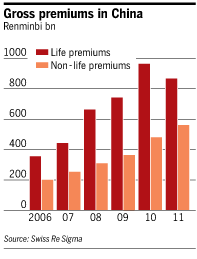China insurers – PICC and mixed
Roula Khalaf, Editor of the FT, selects her favourite stories in this weekly newsletter.
The more you own, the more you want to protect it. Pledge to double incomes, as Hu Jintao, until recently, China’s president, did and insurers should only benefit. PICC, the people’s insurer founded the same month as the people’s republic, is coming to market. But its use of a record number of banks and the fact that more than half the shares have been pledged in advance to big institutions suggest the company does not think this an easy sell. Nor should other investors.

China will need more insurance as it grows richer. Total premiums have grown by a compound rate of a fifth a year for the past six, according to Swiss Re. There is plenty more room to grow: advanced economies spend about 8 per cent of gross domestic product on insurance, or about $6,000 a head. Emerging markets, including China, allot about 3 per cent, or $200.
PICC’s selling point is the potential for its newish life business to grow by using its market-leading property and casualty platform. This unit produces 70 per cent of its gross premiums. Its life arm has grown rapidly since inception in 2005 but is still small, with less than a 10th of the market; China Life and Ping An have almost half between them. PICC’s real vulnerability is that is has already listed a third of its P&C unit, giving investors ready access to its money spinner without needing to bet that its life business will continue to grow.
And then there is how PICC is doing the deal. Up to 17 banks – a global record – will take some credit, mostly for roping in cornerstone investors, which take large chunks before the offering with a six-month lock-up. More than half the deal has gone to these big names, compared with an already high average of 29 per cent this year, according to Dealogic. Cornerstones are common in Hong Kong but they are the public offering equivalent of selling a house with rooms already rented out. Would-be investors must ask why the company felt the need to do this if it was confident in its own prospects.
Email the Lex team in confidence at lex@ft.com
Comments